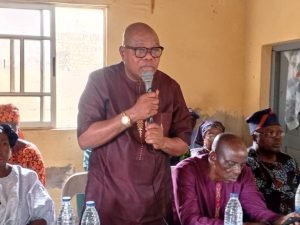FG Projects Digital Economy to Contribute 21% to Nigeria’s GDP by 2030

By Alofe Ayomoses
Nigeria’s economy may witness a historic leap if the proposed National Digital and E-Governance Bill becomes law, as the Federal Government projects the digital sector could contribute over one-fifth of the nation’s GDP by 2030.
The disclosure was made on Thursday in Abuja at a stakeholder validation workshop, where government officials and private sector leaders described the bill as a game-changer for Nigeria’s digital future.
The Minister of Communications, Innovation and Digital Economy, Dr. Bosun Tijani, represented by the ministry’s Permanent Secretary, Mr. Rafiu Adeladan, said the bill would provide a solid legal and regulatory framework to drive Nigeria’s digital transformation agenda.
“Today marks a defining moment in our collective efforts to shape a resilient, inclusive, and future-proof digital economy for Nigeria,” Tijani said.
He explained that the bill would strengthen digital governance, boost secure transactions, improve service delivery, and build public trust in e-governance and digital trade.
₦7 Trillion Contribution
Highlighting the sector’s current impact, Tijani revealed that the digital economy contributed ₦7 trillion to real GDP in the first quarter of 2025, representing 14.19 per cent of the national output.
“At present, the sector contributes between 16 and 18 per cent of GDP. With well-defined strategies, we are targeting 21 per cent by 2030. This demonstrates both the current strength and the untapped potential of a digitally empowered economy,” he said.
Nationwide Consultations
One of the most striking features of the bill, according to the minister, is the extensive nationwide consultation that shaped it.
“Over the past months, we conducted engagements across all 36 states of the federation. This is the first time in Nigeria’s history that a legislative instrument of this nature has undergone such a broad and inclusive process,” Tijani noted.
The consultations were facilitated by the law firm of Duale, Ovia & Alex-Adedipe, with inputs from state governments, civil society, ecosystem players, and the private sector.
Support from National Assembly
The minister commended the National Assembly for its role in advancing the bill, singling out Senator Shuaib Salisu, Chairman of the Senate Committee on ICT and Cybersecurity, and Hon. Stanley Adedeji, Chairman of the House Committee on Information and Technology.
According to him, their legislative backing is vital to secure Nigeria’s competitiveness in the global digital era.
Driving Innovation and Trust
Explaining its core objectives, Tijani said the bill seeks to:
- Promote interoperability across ministries, departments, and agencies.
- Strengthen digital identity systems and secure data exchange.
- Enhance governance processes through e-governance adoption.
- Drive innovation in public and private sectors.
He urged stakeholders at the workshop to contribute robustly, ensuring that the bill truly reflects the aspirations of Nigerians.
Tijani stressed that the legislation will not only accelerate economic growth but also position Nigeria as a leading digital hub in Africa.
“This bill will lay the foundation for Nigeria’s digital future. It will restore confidence in our systems, attract investment, and ensure that innovation thrives both in government and business,” he concluded.







